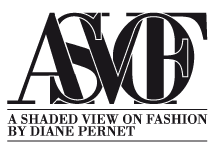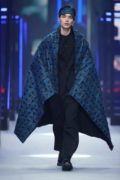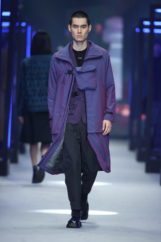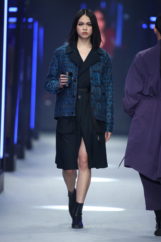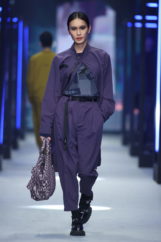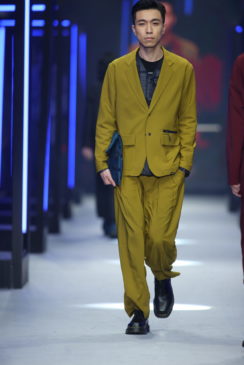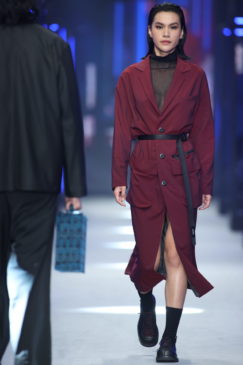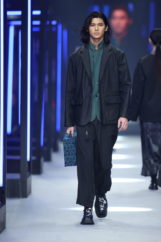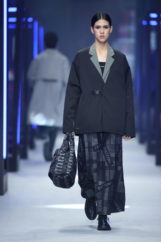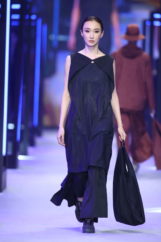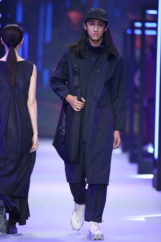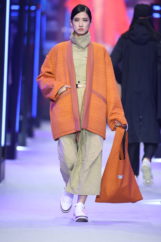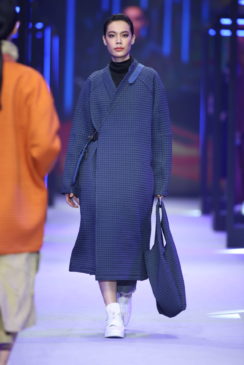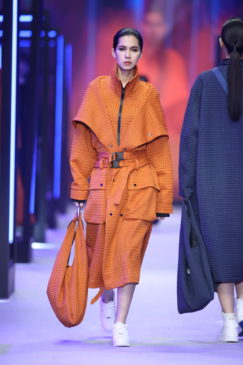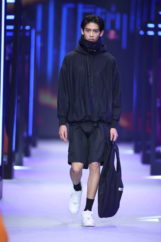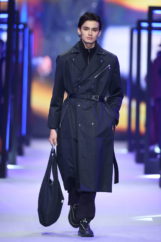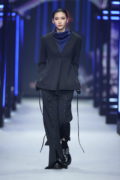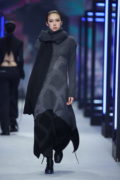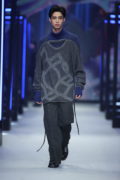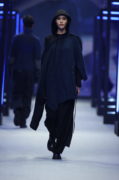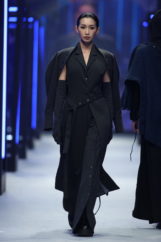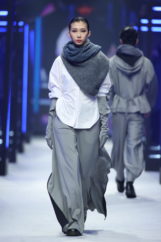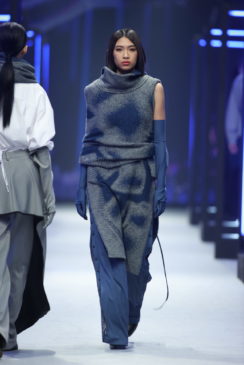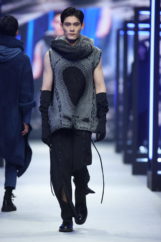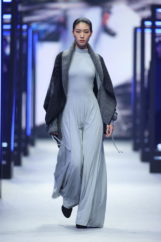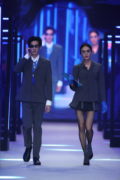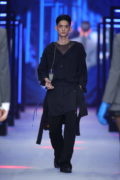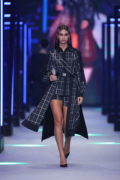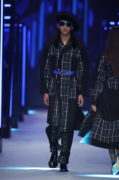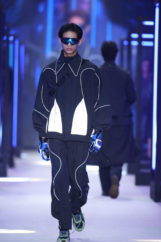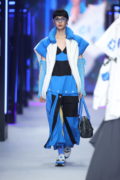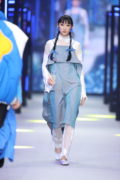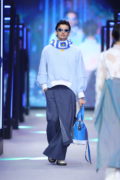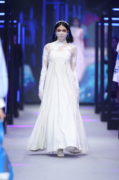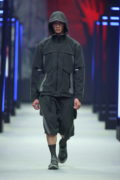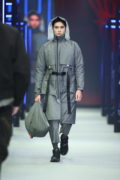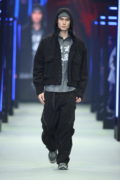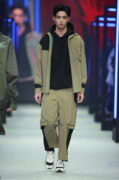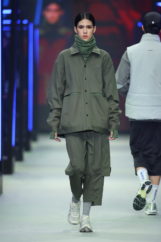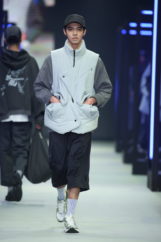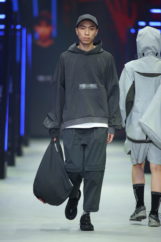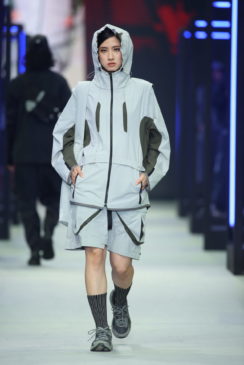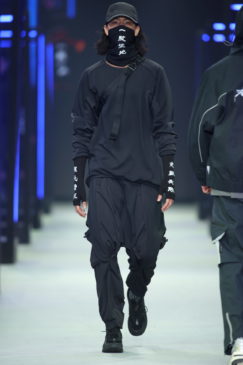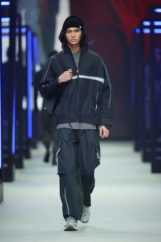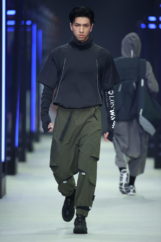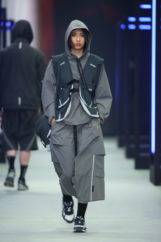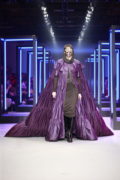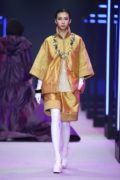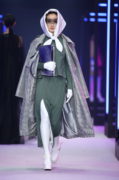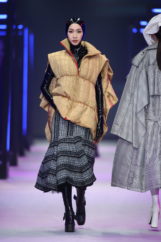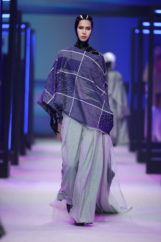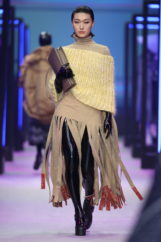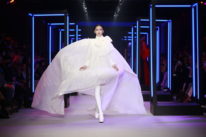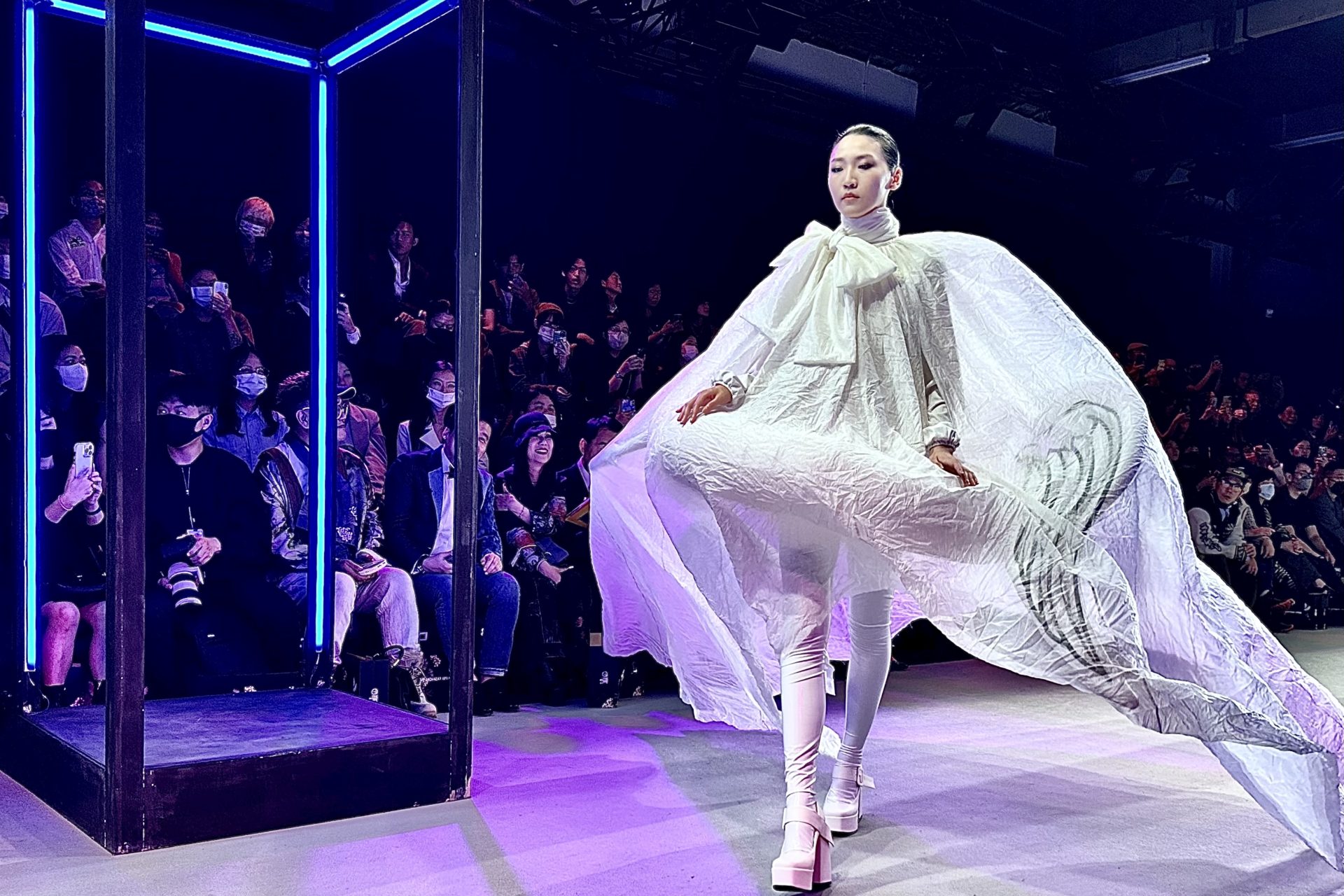
Writing about sustainable fashion events when you’re an invited guest arriving on a long-haul flight can be a balancing act like getting through the catwalk installations unscathed for the model shown above in her fanciful, voluminous winged costume complete with train. In general, when it comes to sustainable fashion, the thought quickly creeps in that a complete abandonment or at least the absence of a fashion show cooled down with air conditioning would represent the greatest act of sustainability. Without getting lost in definitions of whether sustainability is primarily about economic survival, the use of ecological materials, compliance with socially just standards, or in the end a mix of everything, it is nevertheless important to point out that in times of inflationary use of the term sustainability, there are sometimes major differences in interpretation.
According to the organizers of the Taipei Fashion Week, sustainability should also be a major pillar of this week.
A first, probably rather symbolic act could be if there would be a radical renunciation of unfortunately always appearing goodie bags not only here in Taipei, but worldwide at Fashion Weeks. Partly elaborately designed plastic packets with products that only make the paying sponsor or possibly the gifted family at home happy. This omission of promotional products will certainly not save the world but would at least make it easier for trade visitors of a “green oriented” event to take sustainable innovations more seriously. A sponsor is usually of elementary importance in the fashion world – to allow the respective label to exist. But nowadays there are more authentic ways to give visibility to a paying brand in a presentation. And let’s be honest, no one should preach water and instead drink wine themselves. How would it be to inform me as a fashion show guest in the digital press text that instead of a physical gift, the corresponding amount of money has gone to a sustainable project? I would probably be more likely to remember the sponsor’s name. This won’t be a guarantee to avoid greenwashing in every case, but at least there should be less waste to begin with.
This little excursion is not meant to be a rant on sponsors, nor does it solve the complexity of sustainability. Perhaps we can agree on an awareness in this article that we should refine together – both regarding the very big problems and, above all, the small ones that are easy to overlook.
In terms of export value, the Taiwanese textile industry is among the top seven in the world, and it has a long history. The new alignment of the current Taipei Fashion Week is to bring together the Taiwanese industry, which is more known for functional clothing, with younger designers. On the one hand, they hope to strengthen the regional market and, on the other hand, to meet what they themselves call a more fashionable demand using environmentally friendly fabrics. This season, the Taipei Sustainable Collection Show was intended to demonstrate this broader new orientation: Six fashion brands developed fabrics with eight well-known Taiwanese textile manufacturers (Formosa Taffeta, Far Eastern New Century, Li Peng Enterprise, New Wide Group, Yi Shin Industrial, ShinKong Textile, Zig Sheng Industrial and Everest Textile) and used them to create their largely wearable collections – away from pure sports and casual wear. Besides a few show pieces that are popular accents at a fashion show, the plan worked out. The collections shown probably do not break any visionary world records, but this is certainly not necessary in view of the commerciality, which is clearly the point here.
DYCTEAM uses many types of sustainable fabrics such as denim jacquard and functional materials to create a style of clothing that is both practical and of high design quality. According to the label, it aims to bring more comfort and humanity into life. DYCTEAM adds colors to its simple and slim-fit silhouette to appreciate their brand philosophy and simplicity as well as human touches for the future. The materials used are fabrics made from recycled polyester and vegetable raw materials derived from non-edible corn and cane sugar. In addition, they have been combined with a water repellent agent to provide a high level of protection through water resistance. This is both to protect the environment and to protect the wearer, who can use it for outdoor activities, for example.
Find more about DYCTEAM here.
oqLiq is a high-end functional fashion brand founded by Taiwan-based designers Qi Hong and Jiahao Lin. With 10 years of professional experience, the label chooses thick and stiff fabrics in design and a symmetry of squares and circles. The aesthetic of oqLiq combines oriental simplicity with street fashion concepts to redefine the look of outdoor functional clothing. In addition, high color saturation and black are harmoniously combined, 3D jacquard fabrics and monochrome functional fabrics are linked by sewing. These outfits shown take up the theme of “aura protection”, which is known as “astral energy” from anime novels. This emblematic magnetic protective force field is to be integrated into the design, as stated by the designers. Thus, according to them, they create a new form of armor, for the protection of the wearer. The materials used are polyester mechanical elastic yarn and NETUP, a fishnet recycled yarn.
Find more about oqLiq here.
SYZYGY was launched in London in 2019 and has been exhibited in other metropolitan cities such as New York, Paris, Tokyo, and Taipei. The designer Yuanlong Gao is a graduate of the Royal College of Art in the UK and was awarded the first prize of the Italian knitwear Oscar Feel the Yarn. SYZYGY is symbolic of the endless cycle of life. The brand’s philosophy is “one garment, many faces” and makes it its goal to create unique knitted garments and special silhouettes from textiles. Recycled polyester and recycled cotton represent the materials used. The sustainable materials are said to reduce carbon footprint, water consumption and avoid soil pollution by omitting the use of fertilizers. The T/S single side water resistant, single side water absorbing, double side, double colors stretch fabric adds subtle color and three-dimensional texture to the looks.
Find more about SYZYGY here.
PCES is Portuguese and means “Projeto a Cidade E as Serras” (Project for Cities and Mountains) and tries to find the right balance between nature and technology. In doing so, the label aims to encourage a new generation to be more environmentally aware and socially responsible. In 2021, the unisex and seasonless brand was founded by two Taiwan based designers. The boundaries between sports, casual and high fashion clothing are intended to be fluid to create multifunctional collections of sustainable functional fashion. Many of the garments are adjustable in size and style to accommodate a variety of body sizes. Materials are used that would have high stain resistance and water repellency. Many fabrics are made with LIBOLON Ecoya yarn, which is directly integrated into the dye when the yarn is made. This eliminates the need for a water consuming re-dyeing process due to color fastness. There are also many fabrics made from materials such as recycled nylon yarn and recycled PET bottle yarn. The designers emphasize that they also work with recycled fabric scraps, fabric waste or used clothes from tailoring shops. CRZ recycling technology is used, where the waste material is converted into yarn and woven back into fabric.
Find more about PCES here.
WEAVISM is led by Tony Chen and Jiejie Hou, who gained experience in the US and Paris such as Louis Vuitton. Founded in 2014, the core DNA of the streetwear brand is the constant search for the latest materials, the most sustainable processes, and the most functional cuts. The brand not only uses a wide range of fabrics from Taiwanese textile manufacturers such as Ho Ming Textile, but also regularly visits the fabric fair Première Vision in Paris to find the most innovative fabrics and textile information. The label collaborates with the Japanese company Koei Tecmo, creator of video games such as Nioh. Inspired by their new game “Wo Long: Fallen Dynasty,” the fashion designers combine the atmosphere of the game and the martial quotes that caused a stir at the Tokyo Game Show into their streetwear designs. As in the games, every piece of clothing will eventually die, whether by burial or incineration, but there is also the possibility of recycling and reuse. This reminds them of the bugs in nature that are known for disposing of corpses. By using eco-friendly fabrics made from recycled PET bottles and recycled cotton from factory waste, WEAVISM aims to preserve the silhouette and sustainable spirit of this insect.
Find more about WEAVISM here.
UUIN was founded in 2015 by three designers in Taipei: Andrea Liu, Tzutsao Liu and Van Lin. The brand’s creative principle is “life is art”, and there is close cooperation with local craftsmen and artists in Taiwan. The fabrics used are mostly made from locally developed functional fabrics with solid and fine sewing techniques. UUIN uses the image of a prophet in its design to express hope for the unknown. The materials processed are made of sustainable yarns, produced from recycled waste from land and sea, and water-saving nylon.
Find more about UUIN here.
I have deliberately referred only to the Taipei Sustainable Collection Show in this article, as the topic itself is much more complex. I wanted to avoid drilling down further, for example by questioning which supposedly sustainable technologies actually deliver the ecological benefits they promise. I think it is important to encourage young, committed people to face the challenges of our time consciously, and to work together on solutions. The fact that Taipei Fashion Week has put this issue in the spotlight is a step in the right direction – now it’s a matter of scrutinizing the details more cleanly and ensuring that improvements are made. Therefore, I will end with the words of the Taipei-based sustainable fashion and intercultural communication expert Reiting Lee, who said that the Taiwanese textile industry is very adaptable and can master the required level of innovation with the help of its qualified textile engineers with flying colors. Who ultimately sends these impulses remains to be seen. The challenges of the fashion industry are at global level, hence the theme of joining forces applies more than ever. Ultimately, this is an outcome from which other markets can benefit.
All images by Taipei Fashion Week.
